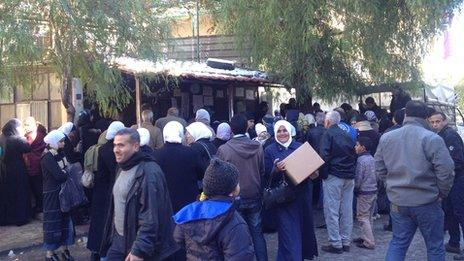Syria's battle for bread
- Published
Lyse Doucet: "Even bread - the denial of bread - has become a weapon of war"
In a punishing war, bread is now a barometer of Syrians' suffering. Even their most basic food has become hard to find, even harder to afford.
In the past two years of a worsening crisis, bread prices have risen by 500% in some areas, according to a new survey obtained by the BBC from the International Rescue Committee (IRC).
Four out of five Syrians say their greatest worry is that food will run out.
"These findings show us that starvation is now threatening large parts of the Syrian population," warns IRC President David Miliband.
In many embattled cities and towns, shortage of fuel, flour and electricity means bakeries and bread can be almost impossible to find.

The World Food Programme has been distributing monthly rations to those in need
And in parts of rural Damascus besieged by government forces and in areas in the north cut off by rebel fighters, bread is a symbol of hardship.
"We haven't eaten a piece of bread in nine months," was the anguished cry of many Syrians we met as they fled the southern Damascus suburb of Moadamiya during a partial evacuation in late October.
Eating less
At government-run bakeries, the price of bread has not changed in 20 years. A traditional flat round piece still only costs two Syrian pounds (£0.01; $0.02).
On a bitterly cold winter's day, Syrians bang their fists on the metal doors of a large bakery in central Damascus, shouting for more bread to be brought out. Syrians of all ages rush by with towering stacks of warm flat loaves.
"We count on this bread for all our meals," one man told me as he clutched bags, three kilos full, to feed his own family, as well as some friends.
"In private bakeries we would have to pay 10 times more," another man chimes in.
Lyse Doucet reports from an aid distribution centre in Damascus on the urgent need for basic supplies
A few streets away, at a crowded distribution site for the World Food programme, country director Matthew Hollingworth observes that "people are eating less, eating less often, and the quality of food is also less".
"Cereal production is down by 40%," he points out, "and the imports are not there to cover the gap."
And it's not just food.
People queuing for a box of monthly rations also plead for blankets and warm clothing for their children. They're available in the markets in Damascus, but these Syrians - displaced by war - simply don't have money to buy them.
Some have moved as often as three times in the past year to escape the fighting. They've lost their homes, their jobs and more.
"I would prefer to live in a tent where my home once was, than to live like this, without dignity," laments Um Aymad who showed up for WFP rations to feed her 16 children and grandchildren. They fled Moadamiya a year ago.
Bigger aid appeal
It's one small sad snapshot of a nation where the UN says 6.3 million people have been forced from their homes, and where nearly half the population now relies on aid.
UN humanitarian envoy Baroness Amos: "They say to me 'why has the world abandoned us?'"
And then there are the more than two million Syrians who've sought refugee, of whatever kind, in neighbouring countries.
"It's one of the biggest crises in modern times," UN humanitarian envoy Valerie Amos told me during her brief visit to Damascus in advance of Monday's launch of an emergency appeal for Syria.
The last appeal several months ago for $4.4bn was the biggest ever humanitarian appeal. Syria's crisis is now even worse, and this time the appeal is even bigger.
"Syrian refugees say to me: 'Why has the world abandoned us?'" recounts Baroness Amos. "The world should really come together to understand what Syrians are facing."